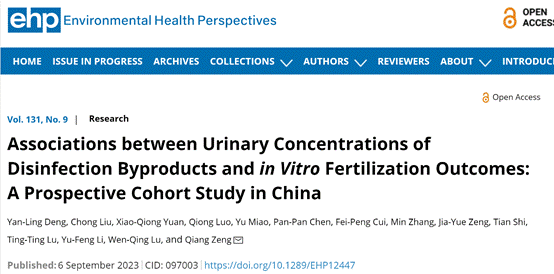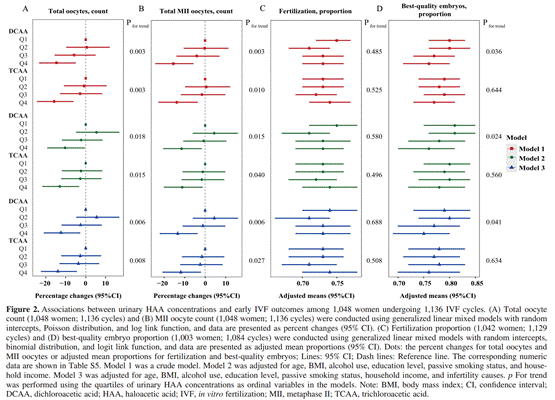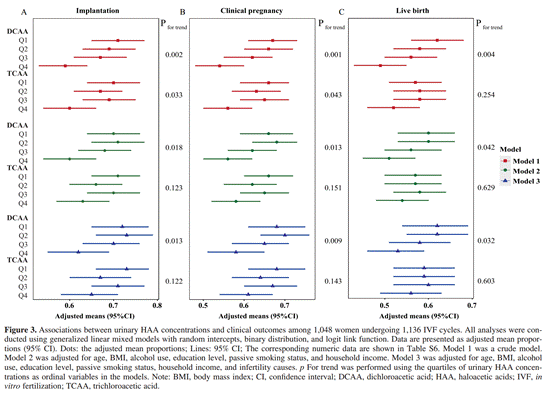Recently. Professor ZENG Qiang 's team from School of Public Health, Tongji Medical College of HUST published a research paper entitled "Associations between Urinary Concentrations of Disinfection Byproducts and in Vitro Fertilization Outcomes: A Prospective Cohort Study in China ' on the top journal ' Environmental Health Perspectives" in the field of environment and health. This study was based on the Tongji Reproductive and Environmental Study (TREE) cohort established by the team. For the first time, it was found that exposure to disinfection by-products (DBPs) in drinking water was associated with the number of oocytes retrieved, the number of mature eggs, the rate of high-quality embryos, the success rate of implantation, the clinical pregnancy rate and the live birth rate in women undergoing assisted reproductive technology. The results show that high exposure to drinking water DBPs in women undergoing assisted reproductive technology may have adverse effects on the outcome of in vitro fertilization-embryo transfer.

Experimental studies show that disinfection byproducts (DBPs) can inhibit oocyte maturation, decrease fertilization capacity, and impair embryo development, but human evidence is lacking.
We aimed to evaluate the associations between exposure to drinking water DBPs and in vitro fertilization (IVF) outcomes.
The study included 1,048 women undergoing assisted reproductive technology (ART) treatment between December 2018 and January 2020 from a prospective cohort study, the Tongji Reproductive and Environmental study in Wuhan, China. Exposure to DBPs was assessed by dichloroacetic acid (DCAA) and trichloroacetic acid (TCAA) in up to four urine samples, which were collected on the day of both enrollment and oocyte retrieval. Multivariable generalized linear mixed models, accounting for multiple IVF cycles per woman, were applied to evaluate the associations between urinary biomarkers of DBP exposures and IVF outcomes. Stratified analyses were used to explore the potential effect modifiers.
The included 1,048 women underwent 1,136 IVF cycles, with 960 (91.6%), 84 (8.0%), and 4 (0.4%) women contributing one cycle, two cycles, and three cycles, respectively. We found that elevated quartiles of urinary DCAA and TCAA concentrations were associated with reduced numbers of total oocytes and metaphase II oocytes and that urinary DCAA concentrations with a lower proportion of best-quality embryos (all p for trends<0.05). Moreover, elevated quartiles of urinary DCAA concentrations were associated with decreased proportions of successful implantation, clinical pregnancy, and live birth (14%, 15%, and 15% decreases in adjusted means comparing the extreme quartiles, respectively; all p for trends<0.05). Stratification analyses showed that the inverse associations of urinary TCAA concentrations with multiple IVF outcomes were stronger among women≥30 y of age (p for interactions<0.05).
Exposure to drinking water DBPs was inversely associated with some IVF outcomes among women undergoing ART treatment. Further study is necessary to confirm our findings.


The School of Public Health, Tongji Medical College, Huazhong University of Science and Technology is the first completion unit of this research paper. Dr. DENG Yanling (now a postdoctoral fellow at the School of Public Health, Emory University, USA) is the first author, and Professor ZENG Qiang is the corresponding author. The research was supported by the National Key R & D Program of China (2018YFC1004201) and the National Natural Science Foundation of China (81872585). At the same time, I also thank the team of LI Yufeng from the Reproductive Medicine Center of Tongji Hospital, Tongji Medical College, Huazhong University of Science and Technology for their strong support.
Paper link:https://doi.org/10.1289/EHP12447.
